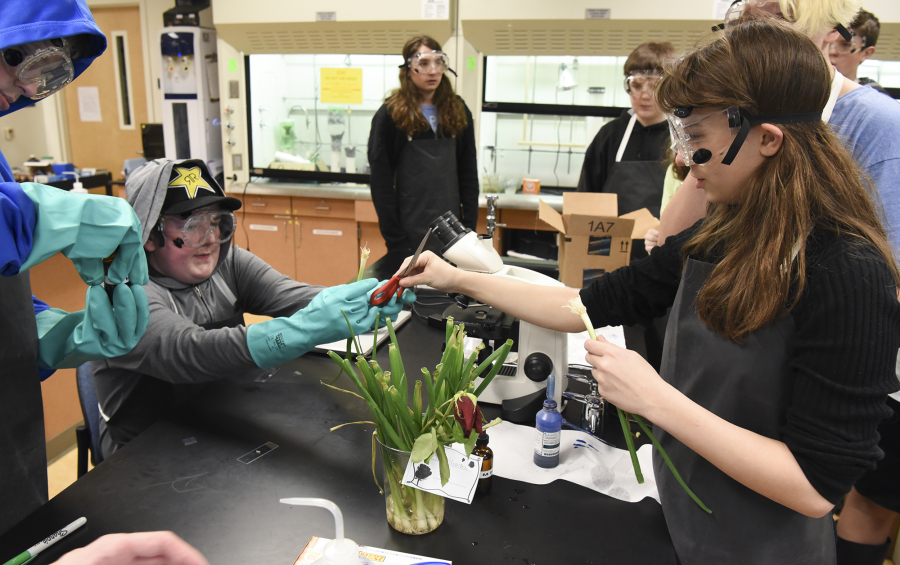The classrooms at Vancouver iTech Preparatory are packed with student projects. From the wastewater drainage systems made from plastic soda bottles and sand to the laser-cut wooden ravens, the school’s mascot, seemingly every wall on campus is a testament to the hands-on learning embraced by the Vancouver Public Schools magnet school.
Vancouver iTech Preparatory’s high school campus is a school within a school within a school. Its high school classrooms are on the first floor of the Clark College building on the Washington State University Vancouver campus, putting high school students in the heart of academia from the time they’re young teenagers.
Vancouver Public Schools will tap the campus as one of its first projects under the recently approved $458 million bond measure, with preliminary planning beginning this year and construction slated to finish in 2020, according to a district calendar. The construction will allow the district to accept 700 students, more than twice the 343 that the grades 6-through-12 school had at the end of last school year. That construction will also bring the middle school program, currently housed at the Jim Parsley Community Center, under the same roof.
Spots are given to students based on a blind lottery. Each ZIP code in the school district is allowed a certain number of students depending on population.
Students enrolled in the unique program take a combination of project-based learning classes and college coursework. Students who pass entrance exams and are deemed mature enough can begin taking college coursework as early as their freshman year, starting with English 101 at Clark College — which, for now, is taught in a classroom upstairs. When the new building is opened, it will still only be a short jaunt across campus.
“The partnership with both Clark and WSU allows us to support students and slowly get them into those college classes … and make sure they have the skills that are necessary and the support that is necessary,” Principal Darby Meade said.
In their iTech Prep classes, students don’t move linearly through a curriculum like in traditional classrooms. Instead, students are presented with problems that need to be solved through projects. That allows students to find creative solutions and draw on their own experiences and knowledge as part of the curriculum.
“The project is the vehicle we use for the learning,” he said.
Though a design for the new Vancouver iTech Preparatory school hasn’t been settled, early concept drawings feature additional lab space for students to tackle such projects. Traditional classrooms are paired with “maker spaces” where students can complete hands-on projects. Small classrooms allow for clusters of students to gather and brainstorm. One concept drawing features a rooftop garden where students can grow their own plants.
“The application of the real-world aspect to their learning makes it more engaging,” Meade said.
Kayl Peck, a 15-year-old sophomore, won a school competition last year by developing a shelter for homeless people in her English and art classes. Students were challenged to solve a real-world problem by inventing something that would improve people’s lives. Students studied rhetoric and speech-giving in English so they could present to a “Shark Tank”-esque panel of judges, and studied drafting in art to draw out their invention.
By using a tarp and recycled political signs, Peck said she was able to build a shelter that improved on conventional tents.
“You basically unfold it,” she said. “It was easier than a tent.”
The challenge of project-based coursework has been a better fit for Peck than conventional classrooms, who called the classes at her previous school “boring.”
“It wasn’t very fun,” she said. “Getting through classes seemed like a drag. Those projects add that element of fun that I think can attract students to learning.”
Jacob Sparks, an 18-year-old senior, also praised the unique curriculum offered at the school. By the time he graduates, he’ll have completed five Washington State University classes. He plans to go to WSU’s Pullman campus next fall.
Sparks doesn’t know what he hopes to study when he goes on to college, but with the skills he’s gained studying at iTech Preparatory, he’s not worried about what the next step holds.
“The opportunities are endless here,” Sparks said. “In algebra, I’ve learned how to use parabolas and bridge design. In English, I’ve learned how to present to a panel. There’s a lot of things I can do.”




